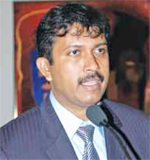TÜV rheinland is a global provider of testing, inspection and certification services. Founded in 1872, it is headquartered in Cologne, Germany, employing more than 16,000 people in 500 locations across 65 countries.
Shanmuga Sundaram, country head, Material testing Laboratories, TÜV rheinland india, spoke to Ashwin Gopinath of eFY about environmental directives and tÜv’s role in helping companies to meet them

Q. What project are you currently working on?
A. The project DG-HSPM (Hazardous Substance Process Management Standard)—part of our corporate social responsibility activity—is a partnership programme funded by DEG Industrial Bank in Germany. This project aims to help the electrical and electronics equipment manufacturing industry in India comply with a new standard called HSPM or ICQ HSPM QCO 80000.
Q. What are the challenges in working with environmental directives for foreign markets?
A. Today, if you are looking to enter European market, you need to comply with certain environmental directives. These environmental directives look to safeguard the environment and the people. So all along, we not only concentrate on producing a quality product but also ensuring that it is not unsafe to the people and the environment. In other words, every product you manufacture should be free from certain identified hazardous substances. It should be designed such that even after its life-cycle is over, it is easily recyclable.
This environmental directive is called WEEE (Waste Electrical Electronic Equipment) directive. It clearly indicates RRR (Recovery Recycling Ratios), which is very important. After the usage, the product should be re-cycling friendly and easily dismantled. You should be in a position to recover more material out of that. If material recovery is not possible, you need to have a better energy recovery. After material and energy recovery, the leftovers going for landfill should not contain any hazardous substance.
So this particular project helps these industries to meet the new environmental directive in Europe, which is called ROHS (Restriction of Hazardous Substance). This particular directive can be identified with a specific European directive number 2002/95/EC.
Q. Please tell us more about ROHS directive and how your project benefits the companies.
A. This particular directive talks about restriction of six hazardous substances—lead, mercury, cadmium, hexavalent chromium, polybrominated biphenyl and polybrominated diethyl ethers. At the moment, the directive is applicable only in Europe. India too has introduced an India-specific ROHS regulation known as Indian ROHS. The legislation is in force. So all the electronic component manufacturers in India in certain categories will have to control the hazardous substance level in their products by May 2014 whether they export to Europe or serve the domestic market.
Our idea is to help them meet this new environmental initiative. Our project ensures that they meet this hazardous substance requirement not only on a product level but also at the level of raw materials, intermittent products and process chemicals.
The new standard—IECQ HSPM 80000 or IECQ HSPM QCO 80000—is an ideal approach for the industry to adopt system-level compliance. Our project will help the manufacturers to have a complete know-how of this standard and meet its requirements.
We selected ten small and medium enterprises (SMEs) in and around Bengaluru and Hosur to participate in this project. People from these enterprises were completely trained by our experts and qualified as an internal auditor. With our training, they built the in-house capacity. We also helped them identify the gap in their existing system.
Q. What’s the selection criterion for SMEs to participate in this project?
A. Basically, the organisation should deal with electrical or electronics equipment. Or, it can be a supplier to these industries. Also, it must be ISO 9000 certified.
Q. Is HSPM compulsory in India?
A. HSPM is not compulsory even across the globe, but it will help you meet some requirements of the regulation in Europe.
Q. So if you are not HSPM certified, you will not be able to export to Europe, right?
A. That’s correct. In China, 1500 companies have already been certified. It is very active in Taiwan, the whole of Europe and the US because all these countries already have their restriction of hazardous substances related regulations in place.
Q. What should ISO 9001 certified companies do?
A. At the moment, most companies are ISO 9000 certified, 14000 certified or even 27000 certified, but this particular standard will help them control the use of hazardous substances. Their quality policy, management objectives, and communications and management representatives will have a specific method to control the hazardous substances. They even have to plan the hazardous substance assessment and control at a regular interval. So the entire activity of the organisation will ensure that the HSPM is implemented thoroughly. That is the reason why this standard works on top of ISO 9001.
Most of the ISO 9001 clauses are common in QCO 80000. But it is not practically possible to analyse every product or sample. It is time-consuming as well as capital-intensive. Rather, a system-level approach where the system doesn’t allow processing or procurement of any of the hazardous substance materials is ideal. This standard will help companies to migrate from the existing level to that of a particular hazardous substance-free level.







we want HSPM certification for My company. can u certify in India. we want this on urgent basis.
pls. reply soon if you can do.
thanks